
Gambling is the wagering of something of value on a random event with the intent of winning something else of value, where instances of strategy are discounted. Gambling thus requires three elements to be present: consideration, risk (chance), and a prize. The outcome of the wager is often immediate, such as a single roll of dice, a spin of a roulette wheel, or a horse crossing the finish line, but longer time frames are also common, allowing wagers on the outcome of a future sports contest or even an entire sports season.

Experimental economics is the application of experimental methods to study economic questions. Data collected in experiments are used to estimate effect size, test the validity of economic theories, and illuminate market mechanisms. Economic experiments usually use cash to motivate subjects, in order to mimic real-world incentives. Experiments are used to help understand how and why markets and other exchange systems function as they do. Experimental economics have also expanded to understand institutions and the law.
The term preference relation is used to refer to orderings that describe human preferences for one thing over an other.

Kings in the Corner, or King's Corners is a multi-player patience or solitaire-style card game for two to four players using a standard 52-card pack, the aim being to be first to shed all one's hand cards.
Utility is a measure of the happiness or satisfaction gained from a good or service in economics and game theory.

New Institutional Economics (NIE) is an economic perspective that attempts to extend economics by focusing on the institutions that underlie economic activity and with analysis beyond earlier institutional economics and neoclassical economics.
Concentration can refer to:
A reverse, in the card game contract bridge, is a bidding sequence designed to show additional strength without the need to make a jump bid; specifically two suits are bid in the reverse order to that expected by the basic bidding system. Precise methods and definitions vary with country, bidding system and partnership agreements.
In a reloading scam, a victim is repeatedly approached by con artists, often until "sucked dry". This form of fraud is perpetrated on those more susceptible to pressure after the first losses, perhaps because of hopes to recover money previously invested, perhaps because of inability to say "no" to a con man.

Cultural economics is the branch of economics that studies the relation of culture to economic outcomes. Here, 'culture' is defined by shared beliefs and preferences of respective groups. Programmatic issues include whether and how much culture matters as to economic outcomes and what its relation is to institutions. As a growing field in behavioral economics, the role of culture in economic behavior is increasingly being demonstrated to cause significant differentials in decision-making and the management and valuation of assets.

Marjolet is a French 6-card trick-and-draw game for two players using a 32-card piquet pack. It is of the Queen-Jack type, and thus a relative of Bezique and Pinochle, albeit simpler. The trump Jack is called the Marjolet from which the name of the game derives.
In psychology, economics and philosophy, preference is a technical term usually used in relation to choosing between alternatives. For example, someone prefers A over B if they would rather choose A than B. Preferences are central to decision theory because of this relation to behavior. Some methods such as Ordinal Priority Approach use preference relation for decision-making. As connative states, they are closely related to desires. The difference between the two is that desires are directed at one object while preferences concern a comparison between two alternatives, of which one is preferred to the other.

The following is a glossary of terms used in card games. Besides the terms listed here, there are thousands of common and uncommon slang terms. Terms in this glossary should not be game-specific, but apply to a wide range of card games played with non-proprietary packs. It should not include terms solely related to casino or banking games. For glossaries that relate primarily to one game or family of similar games, see Game-specific glossaries.

This glossary of economics is a list of definitions containing terms and concepts used in economics, its sub-disciplines, and related fields.

In card games, a talon is a stack of undealt cards that is placed on the table to be used during the game. Depending on the game or region, they may also be referred to as the blind, kitty, skat, stock, tapp or widow (US).
Müller Matz is a shedding-type card game that was played in the first half of the 20th century, and probably in the 19th century, in the Baltics.
Rabouge is a German card game for any number of players and played with French-suited cards. The aim is to discard one's cards as quickly as possible to a central pile. The game resembles Russian Bank patience for two, but is easier to play.
This page is based on this
Wikipedia article Text is available under the
CC BY-SA 4.0 license; additional terms may apply.
Images, videos and audio are available under their respective licenses.





